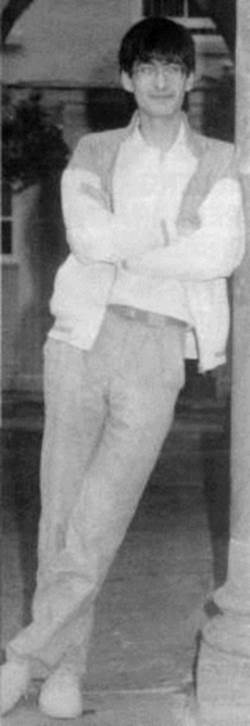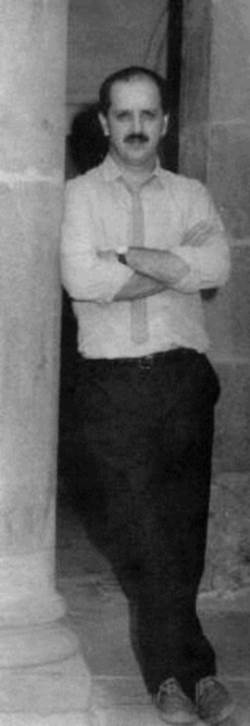


COSTA PANAYI is a name you tend to remember, and in Spectrum circles it is a name firmly associated with 3D games. Games such as TLL, Cyclone, Android II, Highway Encounter and of course, this month’s Smash — Revolution.
Costa is the main man when it comes to programming at VORTEX, the Manchester-based software house, while LUKE ANDREWS takes care of the business affairs. Costa and Luke came to Ludlow with one of the first copies of Revolution for us to review, and while they were here Graeme Kidd seized the opportunity to talk to the duo with a persistent reputation for producing quality games.
Like quite a few software houses, VORTEX began life as a hobby. Costa Panayi first got interested in computing back in the ZX81 days at the end of 1982. He was working as a mechanical engineer and bought one of Sir Clive’s home computers, played around with it and swapped programs with ZX81 owning friends. Then he got together with a few friends, they decided they could write programs and gradually the hobby started to pay for itself:
“Our first games were Pontoon and Othello — small BASIC games — and we sent them off to a publishers and started earning royalties! Once we’d written and sold those games we bought books on machine code and started learning. Then the Spectrum came out and we wrote Cosmos and Android I.
“Soon, we realised that writing programs was okay as a hobby, but when we tried to run a business on the side it was taking up too much time. We knew Luke, who was a teacher at the time, and he was interested in the business side of things...”
Luke takes over the story: “I got involved on the business side to allow the lads to program — everything was still being done on a part-time or hobby basis and with the talents that everyone had, everyone fitted in quite nicely so we just progressed. Everyone who’s been associated with us has really helped and encouraged us — people have seen that we’ve worked hard and that we’ve got the product, and everyone’s pushed and said ‘well done’ which is great. Sometimes, a lot of people just say ‘oh don’t bother’ or whatever, which is a bit demoralising, but we never had to face that.”
Gradually, what was a fairly lucrative (and time consuming) hobby grew to the point where it was a backroom industry and then, during 1983, the team got together, decided on a plan and began to run Vortex professionally. It was clear the company was successful enough to warrant people giving up their ‘day jobs’: “Yes, we bought premises, employed people and so on. In some ways we’re cautious on the business side, as we are on the programming side, in the sense that Cos has always come out with excellent stuff, and we are more geared to quality than quantity,” Luke explains. “Naturally, we all had a few regrets when we first started out writing and selling programs full-time — you’ve got a secure job and are doing well in it and it comes to the point where a part-time job suddenly has to at least equal what you were doing before, then decisions become a bit difficult. We got to the stage where we thought to ourselves that we’d succeeded so far and got to a certain level and we had to make a decision. We couldn’t really turn back, though. The biggest worry was whether the computer craze would die out overnight. Quite clearly, that isn’t going to be the case.”
Costa Panayi’s games have been the backbone of Vortex’s success, although other releases like Alien Highway have involved other programmers heavily... Obviously, a company such as Vortex gets sent quite a few programs for evaluation. Have they never been tempted to start a budget label, for instance? Luke explains: “I suppose we could easily have started another label on the budget side, but it’s not the sort of thing we want to do. How can you one day be sat down working out something really complicated and new, and two hours later try and promote a game that sells for £1.99? Your heart’s not in it. Maybe some people can work that way, but I don’t think we could...”
Working as a design engineer, Costa was involved in 3D geometry on a daily basis, so when it came to programming games it’s not too surprising that 3D techniques came quite naturally to the fore. “I’m quite fascinated with 3D — I’ve always liked to have things neatly arranged and geometrically correct, and I suppose my engineering background all tied in with programming.”
Costa first took the plunge into 3D with Android II and since then all his games have been in 3D. “It just seems like a step backwards to return to 2D now — I find you get a feeling of space when you’re working in 3D, and I don’t think I could write in 2D. It would be easy enough to do, but I wouldn’t want to.”
With a string of successful games behind him (the lowest overall rating Costa collected was 79%), he’s invested a fair bit of time, effort and expertise into developing 3D techniques on the Spectrum. But it’s not just a question of keeping routines and adding to them — Highway Encounter meant starting from scratch again, and Revolution is another fundamentally different style of display and programming. “I like to take a completely different approach to the way I handle the 3D in each game,” Costa explains, “It would be nice to come up with some sort of new system which gets out of the mould. We did it with Highway, and then we decided that we had to come up with something different, totally away from the shoot em up type game. After Revolution, it would be nice to do something completely different again. It’s as much a matter of looking at the game types and the way games play as actually looking at the environment — you can keep producing 3D games, the same games with a different scenario, but the difficulty is in coming up with something different.”
Revolution was designed with lastability in mind, so far as the gameplay was concerned. Each time a new game starts, the puzzles are shifted around between levels and their locations on individual levels are also changed randomly. “Shuffling the puzzles round and creating a new landscape, or set of levels, each time you start to play — it’s trying to make the game something more than other games on the market,” Luke says, “even with our old games, you always had the first level, second level, third level and so on, and you knew what was coming. Alien Highway, the remix of Highway Encounter started us thinking that way, and with Revolution I think the changes in the puzzles and landscape are the main attraction. If someone picks up the game and can’t get past the first level, then the game can be played on level one and the player still gets thirty new puzzles — so you can still enjoy it, even if you never get past the first level!”
Vortex appear every six months or so — two games a year is about all Costa can handle on his own. They take a different approach to designing games too: there’s never a storyboard to work from: “Well, I come out with ideas — as does everybody,” Costa explains, “and we throw them about and we always seem to reach a point where we say ‘that’s a good idea, why don’t we go ahead and see what that brings forward?’. Ideas that we find in the meantime are thrown in as well.”
“It’s a process of continual design rather than continual refinement,” Luke adds, “For instance we might decide to do something that has two animation stages in it, and Costa goes away and works for about two weeks on it and comes back with five stages of animation. We say to him ‘I thought you said it could only be two stages’ and he’ll say ‘yes, well it’s different, there’s five now!’”
“With Revolution we thought there are no bouncing ball games, so why don’t we have a go? And suddenly all these ball games started appearing! They all tend to be rolling rather than bouncing, so there’s a difference,” Costa adds, “The same thing happened with Cyclone — it seemed a natural progression from TLL and then there were dozens of helicopter games on the market suddenly...”
Things are moving for Vortex. They’ve just signed a deal with US Gold, who will be taking care of the marketing side of things for them in future, and they plan to expand: “Now that the market’s moved on to Europe, and we’ve moved on, Vortex has outgrown the Vortex team and with this deal, some of the pressure is taken off us. We can really concentrate on producing the software, and the aim is to build a team around Cos to keep producing the same standard of games. We have our own standards, and intend to stick to them. We’re looking for talented programmers up in Manchester, so if anyone would like to get in touch...”
Obviously, with a six month lead time on a Costa Panayi game, there’s unlikely to be another release in time for Christmas. But with the plans for taking on extra hands, who knows? Luke and Costa left for Manchester smiling enigmatically. They may have something in the pipeline for the festive season after all...